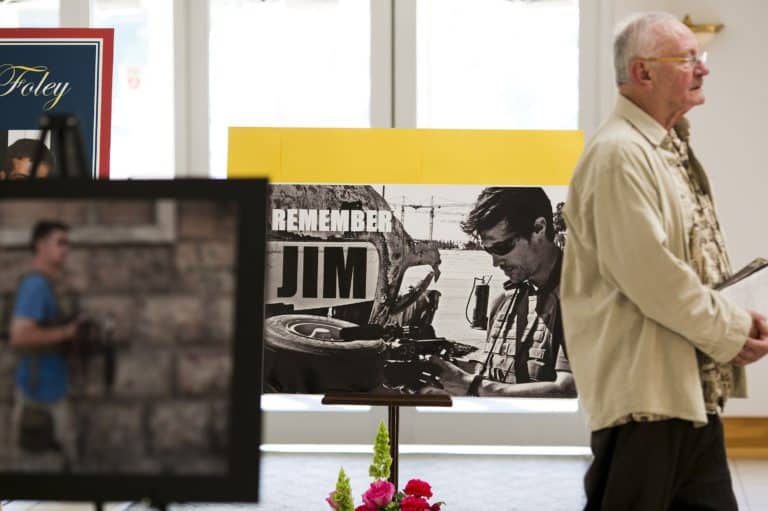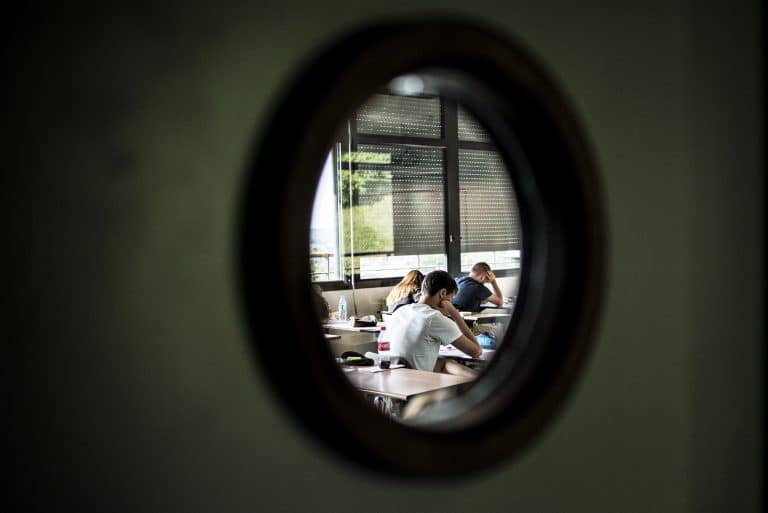
A parishioner walks past a display of photos of James Foley before a Catholic mass at Our Lady of the Holy Rosary Parish in Rochester, New Hampshire. Image by Dominick Reutre/AFP/Getty Images.
The Unbearable Weight of World News
The baby is snoozing away in her Pack n’ Play in the bathroom (don’t judge, travel requires serious sleep innovation). My dad has just grilled up some thick burgers. My mom, my husband, and I sit down at the table, surrounded by the calming hue of adobe and the electric Santa Fe sky that lives up to the hype, particularly around sunset.
And then I make my mom cry.
“Did you read the news about James Foley’s beheading?” I ask. My husband talks about his brother, who went to college with James Foley. We express our horror then transition into talking about the danger journalists face reporting in regions like Syria or on topics like combat, the drug trade etc. I slowly — too slowly — realize that my mom’s eyes are filling with tears.It’s been a rough news month. Let’s be real, it’s been a rough news decade. (As I was working on this column, I heard that journalist Steven Sotloff suffered the same fate as James Foley, despite his family’s pleas.)
So how does one process all the heartbreaking news? I’m not talking about the much-discussed decision whether to watch the brutal violence done to James Foley and Steven Sotloff. In some ways, that choice is easier because it’s acute. You do or you don’t; you suffer the psychic consequences.
I’m talking about the chronic, contemporary pain of being an informed person. You wake up, reach for the phone next to your bed, start scrolling through Facebook and — just like that — you are immersed in the eternal stream of rubble, corruption, and death that is the daily news cycle.
My mom’s been making a concerted effort to take in less bad news on a regular basis. As a result, she just isn’t as “scabbed over” as the rest of our family. “I try to titrate my exposure to news because media focuses mostly on horrific kinds of stories,” she explains. “I don’t feel the human psyche is wired to take in that amount of sadness.”
I think a lot of us feel this way. In fact, studies show that “not only are negatively valenced news broadcasts likely to make you sadder and more anxious, they are also likely to exacerbate your own personal worries and anxieties.” According to Pew, despite purported civilian massacres and so many other harrowing events in Syria, just 12 percent of Americans follow political violence in that country very closely. Some of this may be disinterest, but could it possibly be an act of self-preservation, intentional or otherwise?
In some ways, titrating her consumption overall actually produced a more moral response in my mom in the moment; whereas my husband and I were able to speak about James Foley’s death with sadness, to be sure, but also with a certain amount of detachment. My mom’s response was actually closer in line with her own humanity and James Foley’s humanity. His death in Syria is an event worthy of tears, even for a stranger in Santa Fe.
From a different angle, however, shielding oneself from the news is dangerous for everyone. If we, the relatively safe and privileged reader, don’t act as witnesses to the world’s violence, how can we fight against it? Is our mental comfort more important than the motivation that our discomfort might produce? Then again, on a deeply practical level, how useful is our motivation? To do what? Where? For whom?
Susan Moller, director of the International Center for Media and the Public Agenda, makes a strong argument that readers must look at the pictures, for example, of the victims of alleged chemical weapon use in Syria. She writes, “…we the adult audience have the responsibility of looking at it — forewarned of the horrors to be seen perhaps, but not coddled into a comfortable obliviousness.”
She continues, “Let us fight against compassion fatigue for the victims outside Damascus, even if the evidence is hard to look at…so that when at some future date more confirmation comes that a crime against humanity has been committed, not only the perpetrator can be brought to justice, but we the people know enough to hold every political leader accountable to humanitarian standards.”
But it’s not just news consumers that have responsibility here. Those of us who produce the media must count it as our moral obligation to reflect the world accurately, which means, indeed, reporting on James Foley and Steven Sotloff and chemical weapon use in Syria and murdered children in Palestine and on and on, but also reporting on the wide variety of responses to our world’s worst social problems. I’m not talking about hero worship — the fluff stories on “truly exceptional” people; I’m talking about stories made of the same rigorous ingredients — evidence, interviews, visuals, analysis — but focused on solutions. It’s what my colleagues and I call “solutions journalism” and it’s a practice we’re trying to spread.
ISIS is beheading brave journalists, but Syrian refugees in Lebanon are using cooking to remember and move on. Innocent Palestinian children have died in the recent flare-up of violence in the Middle East, but an Israeli father invented a citizen emergency medicine model that has equipped ordinary people to save one another’s lives, no matter the religious differences. Ebola is ravaging parts of Africa, but rural Rwanda is also turning out to be the proving ground for a new kind of hospital, where the architecture itself contributes to healing.
When the media actually reflects back the world as it is — horrible and beautiful, tragic and smart, corrupt and innovative — then individual people won’t have to face the damned if you do, damned if you don’t decision of whether to expose themselves to the day’s news. They will feel the desperation that surrounds us all, but also the potential for transformation. That’s not fluff to comfort. That’s not shock-and-awe to sell papers. That’s real and it’s fortifying.
I agree that news consumers should not be coddled, but I also believe that it’s both unethical and inaccurate to provide headlines that almost exclusively reflect back the worst of our humanity. We must shine a light on the darkness, but we must also cease overshadowing the light.

